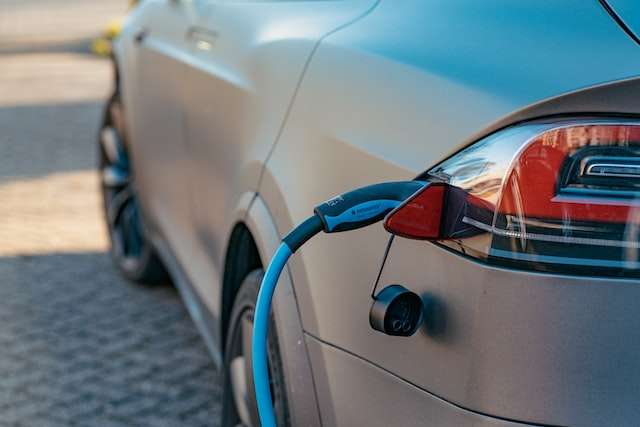E-mobility guide: everything about electric cars in the UK
Survey Experts · 22.11.2021 · 20min read

Content
Silent like a ninja, leaves no traces of smelly exhaust fumes and state-of-the-art technology - this is the picture we have of electric cars.
But electric mobility promises much more than that: emission-free, powered by climate-neutral energy (e.g. solar panels), these are some of the technological wonders that are supposed to lead us into a more environmentally friendly future.
Demand is rising rapidly and politicians could set a decisive course for electric mobility in the United Kingdom in the near future.
It is time for a closer look into the topic. What does e-mobility entail? What is there to know about EVs (electric vehicles)? What do Brits think about e-mobility?
Appinio's Mobility Report 2021 presents a comprehensive survey in five countries. Two thousand consumers respectively in the UK, Germany, France, Spain and the USA, for a total of 10.000 were asked for their opinion on electric vehicles worldwide (representative study, by age and gender).
The following e-mobility guide provides the most exciting insights & walks you through the results, filling you in everything you need to know about electric mobility.
Appinio has summarized the entire study results of the e-mobility study in a 50-page report, download the entire report for free!
Download the Report
What is an electric car?
An electric car differs from conventional cars for one essential aspect: the engine. Instead of diesel or petrol, an electric car is powered by electricity. An accumulator or battery powers the motor. For drivers, this is a “small” diversion on their map: instead of going to the petrol station, the route leads to the nearest power source, the socket.
The fact that our roads are not swarming with EVs is surprising, after all, the idea of an electric car is already more than 100 years old. At the beginning of the 21st century, researchers were working on prototypes, but they failed as the technology was too immature. Mainly because oil was cheaper and had since long established itself as the economic driver of the 21st century.
We’ll need to wait till the 2000s for the electric car to come back into the spotlight, especially for car manufacturers. Since then, brands like Tesla, VW, Renault, Hyundai, Audi or BMW have regularly come out with new models.
In the future, no one will be immune to the charm of electric cars, mainly because they are an important piece of the puzzle to facilitate the transition towards more climate-responsible solutions. In order to make this transition smoother, many countries are planning to ban new registrations of conventional combustion engine cars (also called ICE cars, internal combustion engine cars) in the coming years.
What types of electric cars are there?
It is impossible to imagine an environmentally friendly and climate-neutral future without electric vehicles. The great majority of Brits (88%) believe that electric cars are the future.
However, the technology is still in its infancy when compared to the conventional combustion engine, which has been around for over 100 years. Apart from different vehicle types such as SUVs, pick-ups or trucks, EVs combine different types of technologies, bringing the past and future together in an extraordinary evolutionary step for electric mobility.
- Battery-powered electric vehicles
When we think about a classic EV it is usually the Battery Electric Vehicle (BEV). A Battery Electric Vehicle (BEV) car has an electric motor and operates exclusively through electricity that is stored in a battery. It can be charged either at home or at a public charging station. Compared to the conventional car, this type of EV doesn't need a clutch & it doesn't require gears.
- Plug-in car
Plug-in cars are all the cars in which the electricity is supplied by cable from the charging station via the integrated socket, and therefore need to be plugged-in. These are available in an exclusively battery-powered version, but also in a hybrid version with an internal combustion engine. Here, the additional electric motor supports the conventional main engine to reduce energy consumption.
- Hybrid Electric Vehicle (HEV) - conventional engine
A hybrid vehicle is a car that uses more than one means of propulsion - combining a petrol or diesel engine with an electric motor. The main advantages of a hybrid are that it should consume less fuel and emit less CO2 than a comparable conventional petrol or diesel-engined vehicle. The hybrid car covers most of the distance with conventional fuels, but the electric motor assists with energy-intensive actions such as starting, accelerating, braking, etc. The electronic auxiliary motor thus optimises the combustion process. Nevertheless, having two motors, a hybrid vehicle requires more complex maintenance.
- Plug-In Hybrid Electric Vehicle (PHEV) - electric motor
In this type of hybrid car, the main engine is electric. The additional combustion engine increases the effective range once the battery is empty. However, this conventional engine does not propel the EV, but feeds a generator that charges the battery.
- Fuel-Cell Electric Vehicle
An exception among electric vehicles is the variant with integrated fuel cells. The energy in the cells is generated by the reaction of oxygen with hydrogen. They are climate-neutral and absolutely emission-free, as the only emission is water. The big problem is that there are currently only a dozen fueling stations in the UK. Nevertheless, these EVs are seen as the next possible step in the green roadmap, once the use of hydrogen becomes more suitable for mass production.
(Almost) every road leads to an EV...
Traditionally, innovations encounter a lot of resistance upon their entrance on the market, the technology is not fully developed and it is expensive, so only affluent consumers can afford them.
Electric vehicles remain quite expensive for the time being, we have not reached critical mass yet and the market is still growing. No wonder, one of the first associations for half of Brits (50%) is "EV = expensive prices".
The high price is justified by the use of rare raw materials to build the motor and batteries, and it is understandable that these high initial costs make many potential customers waver. However, the advantages of an electric vehicle outweigh the disadvantages in the long run.
First, an EV results in less ecological strain than its fossil-fuel predecessor in the long term. Secondly, an electric motor is emission-free and much quieter than a combustion engine, consequently less atmospheric & noise pollution!
One could argue that providing electricity to feed EVs also causes strain on the environment as we need factories to produce electricity, but this needs a more holistic approach. Green & renewable technologies, like solar and wind power, will keep spreading and becoming standard practice, therefore, the carbon footprint of EVs is going to be even lower.
Another interesting point that sparks a lot of debate is the heart of electric vehicles: the battery. Contrary to popular belief, the battery of an EV can live a second life. Due to wear-and-tear, EV batteries need to be replaced after some years, but they can be recycled and become another energy storage device. A combustion engine is no longer usable and therefore gets thrown away.
Finally, an electric motor is clearly ahead in terms of maintenance: on average, an ICE consists of more than 1000 parts. An electric motor, including a battery, has only about 200 components. The technology in the EV is lighter, more compact, less prone to failure, making it easier to care for.
... apart from refuelling
Besides the temporary high prices, the biggest hurdle that electric vehicles still struggle with is the range of an electric car.
Electric cars can go only so far on a single charge & the network of charging stations is not yet as extensive as the network of petrol stations, this means that taking long road trips could be far-fetched & it requires quite a bit of planning from a driver perspective (e.g. getting informed on how many charging stations are on the way, allocate extra time to allow enough charging time for the car, account for unexpected events like a broken or occupied charger).
Britain at the moment has around 25,000 charge-points, but the Competition and Markets Authority (CMA) said Britain could require 10 times as many EV charge-points before 2030, as part of its study into the EV charging market to assess availability and reliability of the charging points.
The tardiness of this expansion is putting the brakes on the triumphant march of the electric car, this argument makes it for the most popular when it comes to providing reasons against EVs.
Therefore, it is no surprise that almost three fifths of those surveyed (56%) consider the charging infrastructure for EVs to be unsuitable for everyday use. EV owners, however, seem to be able to deal with it pretty well, as only a third of them (30%) consider the infrastructure to be unsuitable for everyday use.
Brits seem also critical of the range: four out of ten respondents think that the batteries installed are insufficient for everyday use (42%). Owners of an electric car have a very different opinion, only one in four think that battery range is insufficient (25%).
Appinio has summarized the entire study results of the e-mobility study in a 50-page report, download the entire report for free!
Download the Report
Status quo: the state of electric mobility in UK
It is no surprise that mobility and new mobility services have been at the centre of heated debates especially in recent years: we need/want to go places and we love doing in style, with our private car.
We are a very car-centric society but in the wake of climate change and the intensification of climate protection measures, we cannot ignore the red flags in this unhealthy relationship we have with the internal combustion engine.
Some countries put a clear expiration date on the ICE and they are more than ready to break up without remorse. In addition, EVs are subsidised by the government in many countries. In Norway, for example, the 25% value-added tax is scrapped at the time of purchase, which means that an electric car in Norway now costs almost as much as a new ICE car.
In Britain, the government offers grants to buy a plug-in car, especially for cars under 35K (e.g. Tesla Model 3). The maximum grant available for cars is £2,500.
These brands dominate the electric car market in the UK
Pretty much every major car manufacturer is active in the e-mobility space. We can find established players in the mobility field like Toyota, Ford, BMW, Audi, or Honda, but the superstar of electric mobility is only one: Tesla.
The American company under the leadership of Elon Musk has existed since 2003 and brought the first e-series car onto the market in 2008, creating a cult-like following!
In addition to electric cars, the company has also been producing batteries and solar systems in-house. Tesla now offers six model series and, according to its own figures, sold almost 500,000 vehicles in 2020. A large-scale factory, the "Gigafactory" Berlin-Brandenburg, is to be completed this year in order to further boost production and satisfy the high demand more quickly.
The Appinio study also confirms the stardom of Tesla: every fourth EV owner drives a Tesla (28%), followed by Toyota (14%), BWM (12%), Audi (11%) and Ford (8%). Tesla also stands out as a top-of-mind brand: one in two (46%) think of Tesla first when they hear the word electric car.
No other brand is so often associated with the positive attributes of innovative, futuristic and environmentally friendly as Tesla. Only when it comes to aspects such as passion and speed can competitors like Porsche outperform the American manufacturer.
Rising demand on the British market
The last few years have been great for EV sales: electric car sales in the UK have jumped by 186% to 108,000 in 2020, up from just 38,000 in 2019. This growth is six times higher than the average sales growth of electric cars globally at 31% in 2020, putting the UK in fourth place out of 26 countries in the study by accountancy firm UHY.
The UK was marginally behind Germany which also had a considerable increase in electric car sales, rising 207% from 63,000 to 194,000 in 2020.
New registrations for internal combustion engines with petrol, diesel or natural gas are declining (heavily affected by the semiconductor shortage and the pandemic), while registrations for hybrid, plug-in and electric cars are increasing rapidly.
Is this a good signal for the electric mobility industry or are consumers only trying an easy alternative to ICE cars?
Hurdles, purchase criteria and dominant brands - what do Brits really think about EVs?
Electric cars are not yet riding the mainstream wave. The Appinio study shows that half of Brits (52%) still drive an ICE car, and only one in eight (13%) drives a fully electric or plug-in hybrid.
Only three out of ten owners of a combustion engine (34%) say that their next car will probably be electric. Those who already drive electric are very likely to opt for an electric car again (80%).
Appinio has summarized the entire study results of the e-mobility study in a 50-page report, download the entire report for free!
Download the ReportThe majority have never sat in an EV, but the desire
to try it out is great
The majority of non owners have not yet even had the pleasure of experiencing an electric car, two thirds (72%) have never been in an EV. But interest is high, 77% would like to test drive an electric car.
Especially in big cities, people have more contact with EVs in daily traffic or via taxi services & car sharing. Those who have already had the pleasure of a joyride were generally enthusiastic: the majority (57%) found the test run (very) positive, and Gen Zs (18-24 yo) in particular were the most enthusiastic (62%).
The greatest wow effects were provided by the car's silence (57%) and the comfort of the car (48%).
E stands for Environmentally friendly & Expensive
The ban on combustion engines from 2030 onwards is supported by the majority (70%) but only half of Brits (62%) believe that politicians should offer more purchase incentives and subsidies to accelerate the switch to e-mobility. For the majority, the first association with an EV is environmental friendliness (51%), followed by expensive prices (50%).
Plug-in owners think about environmental friendliness first (38%) and futuristic feeling (35%) and innovation (34%), expensive prices come in seventh place (21%).
When it comes to general purchase criteria, nothing is as important as safety (78%) and price (77%). The type of car - i.e. electric or ICE - comes only in third place (58%).
Among those who own a plug-in vehicle, the decisive push for buying an EV, even before sustainability, was: saving money on fuel (48% vs. 40%). Petrol is really expensive at the moment and is bound to become scarcer, making prices rise & rise.
Perception of e-mobility brands: Tesla takes it all
No brand is more associated with electromobility among Brits than Tesla. One in two people think of Tesla when the word electric car is mentioned (46%). Brits associate Tesla also with futurism & innovation (50% and 42% respectively) - which puts Elon Musk's company in first place in each of these dimensions.
Also when it comes to environmental friendliness, the American manufacturer outshines all other brands, on this dimension only Japanese Toyota is following Tesla closely (37% vs. 36%).
Let’s have a look at other big brands: Mercedes & BMW before Tesla when it comes to range (37% & 35% vs. 34%). When it comes to speed and passion in the e-segment, no one stands out as much as Porsche (43% and 23% respectively). BMW is the first for attractive design together with Audi (both at 40%). The driving pleasure category is won by Ford (34%), followed closely by Mercedes & Audi (34% & 32% respectively).
International comparison: EVs in Germany, France, Spain & USA
The Appinio study was also conducted in other countries to get a more comprehensive overview of the market & offer the chance to make international comparisons on the topic of e-mobility.
For example, the Spanish and British respondents stand out with a particularly high level of acceptance for e-mobility: Nine out of ten respondents from Spain (90%) and Britain (88%) are confident to see EVs as part of the future.
In Germany, only two thirds (66%) say the same, France and the USA are in the middle (72% and 81% respectively).
Support for a ban on new registrations of combustion engines from 2030 is also highest in the UK and Spain (70% and 69% respectively).
While the USA is divided (52% in favour), skepticism predominates in Germany and France (only 44% each in favour).
These differences seem surprising if we look at the prevalence of EVs in each country: 13% of each Germans, French & Brits own an EV, in Spain it is marginally less (12%), in the USA it is 10%.
The French & German focus on costs, the Spanish & British respondents dream of the environment
We have already seen that electric cars are often associated with high prices & the same applies to all five countries.
This is also the first thing that comes to mind for the French & Germans above all other countries (61% & 54% respectively). The Spaniards, on the other hand, associate electric mobility predominantly with environmental friendliness (57%). In the USA respondents vacillate between environmental friendliness and high prices (46% and 48%) - similar to the UK.
The topic of futurism enjoys the highest priority in the USA (39%), as the following chart shows. Interestingly to note that, in all five markets, the older the respondents, the more likely they are to associate EVs to expensive prices.
When it comes to which brands are associated with e-mobility, Tesla is clearly ahead in every country surveyed, only in France does the domestic manufacturer Renault engage in a serious tête-à-tête with the industry leader (43% vs. 47%). Toyota is also well placed in the public eye in Spain, France and the USA (26%, 25% and 25% respectively), in Germany the Japanese manufacturer only comes in sixth place behind VW, BMW, Audi and Mercedes-Benz (11%).
The electric train is (slowly) taking off towards a climate-neutral future
For Brits it’s clear: electric cars are the future.
Car manufacturers regularly entice customers with new models, and political "environmental bonuses" are changing the minds of more and more undecided drivers.
Since last year, the sales figures for electric cars in Britain have been rising strongly, and promising figures are forecast for 2021. The topic of electric mobility is increasingly present in the media, at work, in leisure time or among friends and acquaintances.
In order to speed up adoption, there needs to be further financial incentives & more education from business and politics as well as more efforts into expanding the public charging station infrastructure.
The international results of the Appinio Mobility Report 2021 give a clear message: Interest and demand are definitely there!
More about Appinio
The market research platform Appinio enables companies worldwide to receive thousands of opinions from specific target groups in just a few minutes. For the first time, anyone can validate decisions and ideas in real time. As the fastest solution for market research, Appinio provides feedback from 90+ markets and helps companies to turn agility and consumer centricity into reality.
Would you like to delve deeper into the results of this study?
Interested in seeing the data for yourself or launching or your own study? Then sign up to our platform for free, browse all the studies we released and the incredible variety of methods you could use for your own market research project.
Get facts and figures 🧠
Want to see more data insights? Our reports are just the right thing for you!


